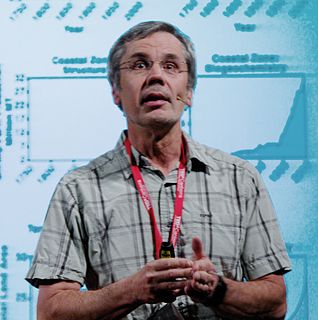A Quote by Will Steffen
Finding mechanisms for putting carbon back into landscapes enhances biodiversity. More biodiverse ecosystems store more carbon, more securely and are more resilient to the impacts of climate change.
Related Quotes
We need to use economic instruments such as carbon taxes, cap and trade, tax and dividend and whatever else to help incentivize behavior that will move us to a post-carbon, post-animal agriculture world, and make our societies more resilient to the shocks that are already baked into the system. But that doesn't make climate change an "economic issue."
The irony is that one of the things people want to solve climate change is more market - more price on carbon so that markets have something to chew on when they think about climate change instead of the complete monopoly, the absurdity of allowing these guys to own the sky for free - socialise all of the costs and privatise all of the profits.
We need healthy forests if we want to protect our climate. As the climate changes, forests become more vulnerable to insect outbreaks, droughts and wildfires. Simultaneously, when our forests are destroyed, their carbon is released back into the atmosphere, further impacting climate change. It's a horrifying one-two punch.
I think the mother of all arguments against eating meat now is the climate change argument. Methane is a much more powerful greenhouse gas than carbon dioxide and when we eat meat we wipe away many of the good things that we do when we try to create greener and more sustainable practices in the rest of our lives. So if you add the concern for climate change with other concerns that were there. I think the case for vegetarianism is pretty overwhelming.
Anything greater than 350 of parts of carbon dioxide per million is more than the planet can safely deal with. It is what's overwhelming our climate system. Because we've been going up about three parts per million per year. And eventually, we will always be above 410, and then above 420, and above 430. We just keep pouring more carbon into the atmosphere.
Scientists tend to focus on what they don't know more than what they do know. And there are a lot of things we still don't know about the climate. But we know the difference between climate variability and climate change, and right now the amount of carbon in the atmosphere is well outside the variability pattern - and that's quite quantifiable.
We have been developing an ever closer relationship with China on climate change for many years which has led to collaboration on carbon trading, offshore wind development, on low-carbon buildings, on nuclear energy, and on carbon capture and storage - to name just some of the ways in which we're working together.

































